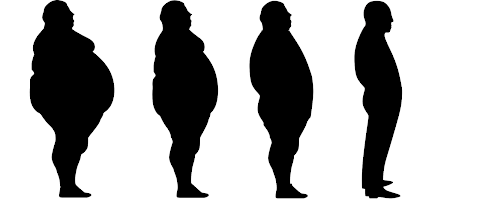An eating disorder is any of a group of psychological disorders distinguished by abnormal or disturbed eating habits. This eating pattern disrupts someone's behaviors, thinking, and mood. It also has a negative impact on interpersonal relationships, education, employment, and physical health.
OBESITY - Eating disorders
 |
| Eating DIsorder |
What is Eating Disorder?
Eating disorders are a type of mental illness that is quite complex. People who are affected by this have a disruption in their food consumption, which leads to related thoughts and emotions.
These people are frequently obsessed with their food and body weight. You've probably met or seen people who are constantly critical of their body image. They struggle to accept themselves as they are. Those people would have no idea, but they could be suffering from eating disorders.
People with this complex disorder are also afraid of gaining weight and will starve themselves to death.
Eating disorders Types
Eating disorders are classified into three types:
- Binge Eating Disorder,
- Anorexia Nervosa, and
- Bulimia Nervosa
As a result, this is an illness, not a choice. You should be aware that there are numerous causes for the development of this serious disorder. If your loved one is suffering from the disorder, you should be aware of the following reasons:
This is a major factor in shaping our mindset regarding body image. We have been taught that a thin body (for women) and a muscular body (for men) are the ideal body shapes. Few people are aware that men and women's bodies can take on a variety of shapes. Our society has always placed an excessive emphasis on appearance. As a result, many people become overwhelmed or obsessed with their weight, causing them to perceive themselves as "too fat."
They will use quick-fix diets to lose weight rather than managing their weight in a healthy manner. They will also begin to starve themselves for no apparent reason.
Genetics plays a role in the development of our bodies. According to studies, the illness of eating disorders generally affects a person when it runs in the family. As a result, it is more common in identical twins than in other siblings.
III. Psychological Factors
According to studies, other disorders such as clinical depression, obsessive compulsive disorder, or alcoholism may contribute to eating disorders in the majority of cases. People who cope with fears or anxiety typically have low self-esteem, perfectionism, and difficulty overcoming/expressing emotions. They are also restless in their reactions to the situations.
IV. Environment
The disorder's complexity may also be caused by disturbances in the environment. People may have had negative experiences in the past, which causes them to create boundaries around themselves. Under stress, activities associated with eating disorders increase. Additionally, some contributing factors could be -
- Childhood adversity
- Peer/social pressure
- Problems with family/other relationships
- Abused physically or sexually
- Bullying as a result of body image
V. In a Stressful Situation
Stress causes serious health problems. It has an impact both physically and mentally. People suffering from eating disorders may experience abnormal chemical reactions in their bodies, which can lead to mood swings and stress. People who are constantly stressed also experience the symptoms.
 |
| Eating Disorder |
What are five signs that someone may have an eating disorder?
An eating disordered person will continue to engage in these behaviors despite physical and personal consequences. This can be caused by a variety of factors and serve a variety of purposes, but regardless of the reason for the eating disorder, these behaviors are harmful and can result in significant functional impairment, even death in extreme cases.
How do you get over an eating disorder?
- Symptoms of Eating Disorders
- chapped lips and grey skin
- Malnutrition and dehydration are causing fainting spells.
- Loss of hair
- Menstrual cycles that are irregular or non-existent
- Sleep patterns have been disrupted.
- Excessive exercise causes musculoskeletal injuries and pain.
- Self-induced vomiting causes dental erosions.
- Constipation, gastroesophageal reflux disease, and other gastrointestinal issues
- Significantly low blood pressure and pulse
- Upper respiratory infections are a risk.
- Low power
- Poor overall health
Eating disorder treatment
Eating disorder treatment is determined by your specific disorder and symptoms. It usually consists of a combination of psychological therapy (psychotherapy), nutrition education, medical monitoring, and, in some cases, medications.
Eating disorder treatment also includes dealing with other health issues caused by an eating disorder, which can be serious or even fatal if left untreated for too long. If standard treatment fails to improve your eating disorder or causes health problems, you may require hospitalization or another type of inpatient programmed.
An organized approach to eating disorder treatment can assist you in managing symptoms, returning to a healthy weight, and maintaining your physical and mental health.
Whether you start with your primary care practitioner or a mental health professional, you'll most likely benefit from a referral to a team of eating disorder treatment specialists. Your treatment team may include the following individuals:
Psychological therapy is provided by a mental health professional, such as a psychologist. A psychiatrist can help you with medication prescriptions and management. Psychological therapy is also provided by some psychiatrists. A registered dietitian will provide nutrition and meal planning education.
Nutritional Assistance
Registered dietitians and other treatment professionals can help you better understand your eating disorder and develop a plan to achieve and maintain healthy eating habits.
Aim for a healthy weight
- Recognize how your eating disorder causes nutrition issues and physical problems by understanding how nutrition affects your body.
- Plan your meals beforehand.
- Establish regular eating habits, such as three meals per day with regular snacks.
- Take precautions to avoid dieting or bingeing.
- Correct health issues caused by malnutrition or obesity
- Eating disorder medications
- An eating disorder cannot be cured with medication. They work best when combined with psychological therapy.
Antidepressants are the most commonly used medications to treat eating disorders that involve binge-eating or purging behaviors, but other medications may be prescribed depending on the circumstances.
If you suffer from bulimia or binge eating disorder, taking an antidepressant may be especially beneficial. Antidepressants can also help alleviate symptoms of depression or anxiety, which are common in people with eating disorders.
You may also require medication to treat physical health issues caused by your eating disorder. Parents should be actively involved in treatment and may supervise meals for young people who are still living at home.
Eating disorder hospitalization
If you have serious physical or mental health problems, or if you have anorexia and are unable to eat or gain weight, you may need to be hospitalized. Anorexia-related severe or life-threatening physical health problems can be a medical emergency.
The most important goal of hospitalization in many cases is to stabilize acute medical symptoms by beginning the process of normalizing eating and weight. The majority of eating and weight loss occurs in the outpatient setting.
Residential eating disorder treatment
Residential treatment entails temporarily residing at an eating disorder treatment facility. If you require long-term care for your eating disorder or have been hospitalized several times but your mental or physical health has not improved, a residential treatment program may be necessary.




1 Comments
This comment has been removed by the author.
ReplyDelete